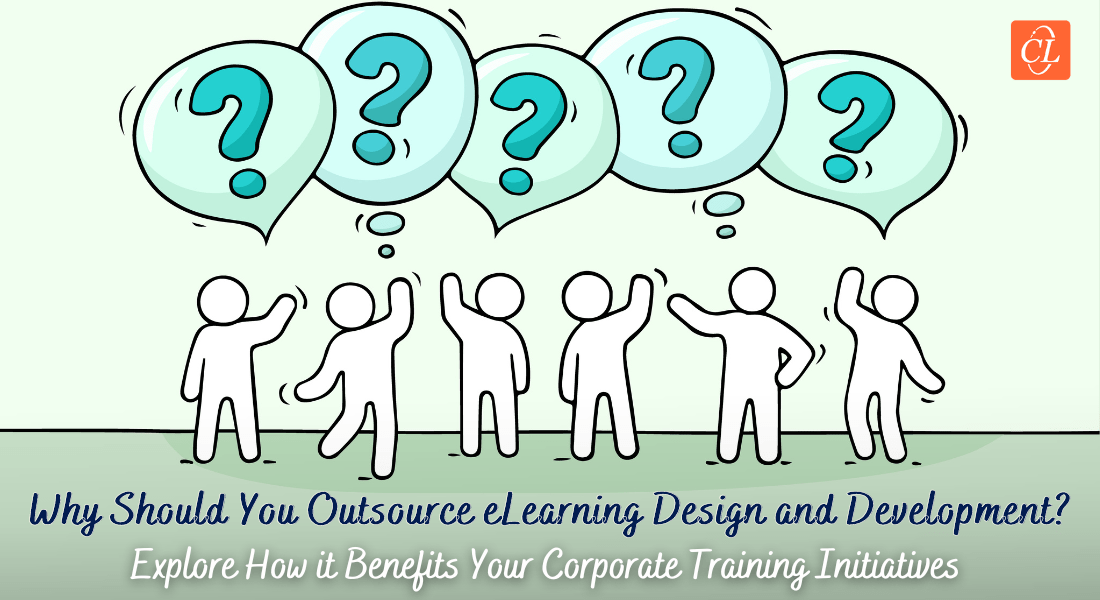When is eLearning Outsourcing the Right Choice for Your Organization?

When it comes to organizational training and skill development, there is no one-size-fits-all solution. The most effective approach depends on the specific needs of the organization. In some cases, it may make sense to outsource eLearning course development. The idea of eLearning outsourcing has been around for quite a while, but it has recently grown in popularity.
Finding the Right Outsourcing Partner can be Taxing at Times
Here are some factors to consider:
- What are the organizational training and skill development goals?
- What specific skills are you looking to improve?
- Are there any internal resources available to develop eLearning content or improve these skills?
Continue to read to know more about them
According to Statista Research Department 25% of companies outsourced their eLearning training and development ventures across different industries, with instruction, facilitation, and educational organizations being the leading outsourcers (63%).
But how do you know when it is time to outsource your eLearning ventures, whether you need to develop a dedicated course or train your own employees. What are key indicators suggesting that you need to outsource?
In this article, we will go over the key factors to consider when deciding when eLearning outsourcing is the right decision for your organization and when an in-house solution would be better.
Key Factors to Consider When Deciding the Right Time for Outsourcing
Here are some factors to consider when considering whether you need to outsource organizational training and skill development:
- What are the organizational training and skill development goals?
- What specific skills are you looking to improve?
- Are there any internal resources available to develop eLearning content or improve these skills?
- What is the budget for training and development?
- Does your organization have the necessary expertise to develop eLearning content?
- What is the timeline for developing and delivering eLearning content?
Depending on the answers to these questions, outsourcing eLearning course development may or may not be the right choice for your organization. Let’s take a closer look at some of these factors.
Explore a handy all-in-all guide on outsourcing eLearning design and development.
1. What Are Your Goals?
The first step in any organizational training and skill development initiative is to identify the goals. What does the organization hope to achieve by providing eLearning content? What specific skills do you want to improve? What will be the benefit of these developments and skills? Once these goals are clear, it will be easier to determine whether outsourcing is the best option.
2. Are There Any Internal Resources Available?
Another important consideration is whether there are internal resources available to develop eLearning content or hone these specific skills. If the answer is yes, then outsourcing may not be necessary. However, if there are no internal resources available, or if the resources that are available are not adequate for the task, then outsourcing may be the best option.
3. What Is Your Budget?
Cost is always a major factor to consider when making any decision about training and development. When it comes to eLearning course development, there are two main cost considerations: the cost of eLearning development and the cost of delivering the content.
Outsourcing is usually more cost-effective than hiring an in-house team, but if you already have access to a certain skill set and the right authoring tools for eLearning development, outsourcing may not be the best option for you.
4. Does The Organization Have The Necessary Expertise To Develop eLearning Content?
As mentioned above, you need to consider whether your organization has the necessary expertise and tools to develop eLearning content. If the answer is no, then outsourcing may be the best option. However, if the organization does have the necessary expertise and tools, then outsourcing may not be necessary.
5. Timeline For Developing & Delivering eLearning Content
The timeline for developing and delivering eLearning content is another important consideration. If the organization needs content delivered quickly, then outsourcing may be the best option because it is most likely their primary niche. However, if there is no time constraint, then outsourcing may not be necessary.
Outsourcing eLearning training and skill development can be a great way to ensure high-quality content is developed quickly and efficiently, be it for macro or microlearning.
6. How Does eLearning Outsourcing Work?
Now that we’ve looked at when outsourcing eLearning course development may be the right choice for your organization, let’s take a closer look at how it works.
There are two main types of eLearning outsourcing: offshore and nearshore.
- Offshore outsourcing is when an organization enters into a contract with a company in another country to develop eLearning content.
- Nearshore outsourcing is when an organization enters into a contract with a company in a neighboring country to develop eLearning content.
The way you outsource your training needs also dictates how the process works. This usually depends on the sourcing strategy that the outsourced company uses. There are two industry models:
Business Process Outsourcing (BPO)
The company uses an existing process or methodology and applies it to your training needs.
Knowledge Process Outsourcing (KPO)
The company uses its own expertise and knowledge to develop a custom solution for your targets and achieves them independently. This does not require any micromanagement or specific knowledge from you.
When choosing an outsourcing partner, it’s important to consider the company’s experience, expertise, capacity, and how they work.
The Pros & Cons of eLearning Outsourcing
Outsourcing eLearning course development can be a great way to ensure high-quality courses are developed quickly and efficiently. However, it’s important to understand both the pros and cons of outsourcing before making a decision.
Some of the main pros of outsourcing eLearning course development include:
Advantages
Access to expert resources
When you outsource eLearning course development, you have access to a team of experts who can help you create high-quality courses. This is especially beneficial if you don’t have the internal resources to develop the content yourself.
Faster development
Outsourcing eLearning course development can help you get your content developed faster than if you were to do it yourself.
Cost savings
Outsourcing eLearning course development can be more cost-effective than developing the content in-house. This is because you don’t have to pay for the overhead costs associated with developing the content yourself.
Disadvantages
Lack of control
When you outsource eLearning course development, you lose some control over the process.
Communication problems
There may be communication problems when you outsource eLearning course development.
When to Outsource eLearning Training Development
To summarize, there are a few main reasons why you might want to outsource eLearning training development. These include:
- You don’t have the internal resources
- You need expert help
- You want to save time
- You want to save money
If you have any of these requirements in your organization, it may be time to think about eLearning outsourcing.
When Not to Outsource eLearning Training Development
Now, there are also a few reasons why you might not want to outsource eLearning organizational development and skill learning courses. Some of the most common reasons include:
Your control and involvement are essential for the course to be viable
One of the main reasons why you might not want to outsource eLearning training development is that you want to maintain control over the process. This is especially true if you’re developing complex content or want to create a custom solution.
You have sufficient resources to create a high-quality course
Another reason why you might not want to outsource eLearning training development is that you may already have authors, even if it takes a lot of time. Provided you are not on a deadline or have budgetary constraints, in this case, you don’t need to outsource.
You don’t want to communicate the course outline
A final reason why you might not want to outsource eLearning training development is that you don’t want to communicate the “secret methods” or your ideas to a third party.
It’s a Wrap!
Outsourcing eLearning course development can be a great way to save time and money. However, you should always consider the pros and cons carefully before making a decision. This will help you make the best decision for your organization. Download this free eBook now to explore more about the tips and tricks to choose the right outsourcing partner.





